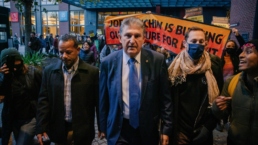As a veteran climate and social justice activist, I see our side finally beginning to turn the tide.
By Ted Glick, The Nation
“You are wearing people out,” complained Senator Joe Manchin at a March 4 hearing of the US Senate Energy and Natural Resources Committee, which he chairs. The West Virginia senator, who reportedly receives $500,000 a year from the coal company he founded and that’s now run by his son, was reprimanding three commissioners of the Federal Energy Regulatory Commission, the little-known, immensely powerful agency that regulates the interstate transmission of electricity, methane gas, and oil. FERC’s approval is required before private companies can install an oil or gas pipeline, build a liquid natural gas terminal, or construct other types of fossil fuel infrastructure. In the past, that approval has almost always been given: Since 1999, FERC has approved 99 percent of the gas industry’s project applications, which is no small reason why the planet is dangerously overheating.

Manchin was angry because FERC had recently signaled a potential change in course. On February 17, the five commissioners whose decisions set FERC policy had adopted a new policy: Before FERC would rule on a given project, an impact assessment would be required. FERC would assess the proposed project’s effect on local landowners and communities, including low-income communities where people of color often predominate, as well as the project’s effect on the environment in general and climate change in particular.
The vote adopting the new policy was close: 3 to 2, with the three commissioners who were Democrats outvoting the two Republicans. At his committee hearing, Manchin directed his ire at the three Democratic commissioners. “There’s a policy by some of death by a thousand cuts on the fossil fuel industry,” he said, before warning that the new FERC rule threatened America’s energy security and economic prosperity. If their projects had to pass such a community and environmental impact assessment, Manchin added, private companies might not pursue the projects in the first place. “I know these people,” he said, in an inadvertently revealing comment. “They’re not going to invest. They’re going to walk away.”
Recent Posts
‘Unconstitutional. Unethical. Authoritarian.’ ICE Bars Millions Of Immigrants From Bond Hearings
July 18, 2025
Take Action Now One watchdog said the new policy “seems like a blatant attempt to stop them from exercising their right to due process.”……
Americans Are Not Nearly Alarmed Enough About Climate Change
July 18, 2025
Take Action Now Americans still don’t comprehend how imminent, dangerous, and far-reaching the threat is—and journalists are partly to blame.By…
The IRS Is Building A Vast System To Share Millions Of Taxpayers’ Data With ICE
July 17, 2025
Take Action Now ProPublica has obtained the blueprint for the Trump administration’s unprecedented plan to turn over IRS records to Homeland Security…
Israel’s Sudden Assault On Syria Is Unchecked Aggression
July 17, 2025
Take Action Now Jerusalem is bombing Damascus and threatening al-Sharaa’s rule, while Washington was hoping to help the nascent government on…




